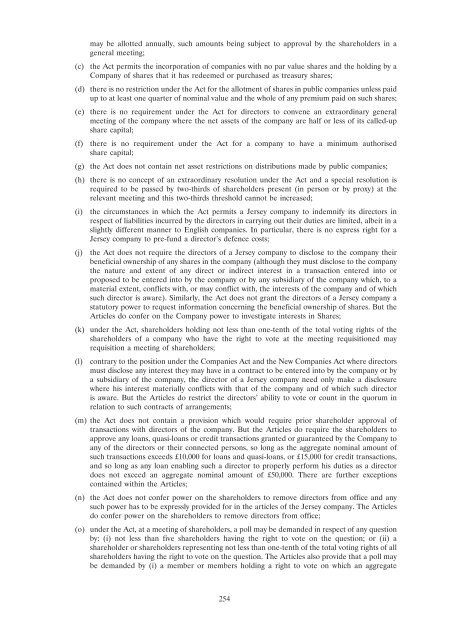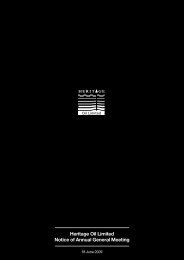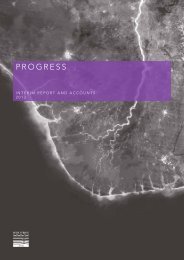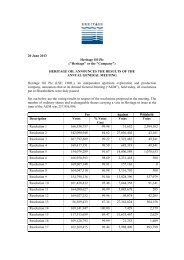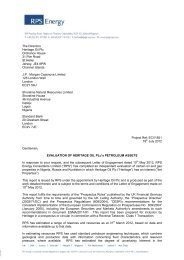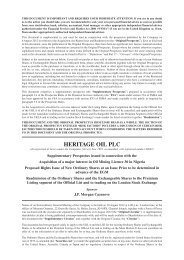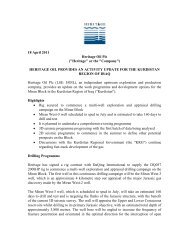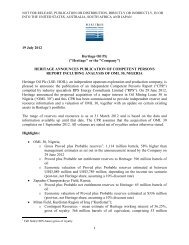Prospectus re Admission to the Official List - Heritage Oil
Prospectus re Admission to the Official List - Heritage Oil
Prospectus re Admission to the Official List - Heritage Oil
Create successful ePaper yourself
Turn your PDF publications into a flip-book with our unique Google optimized e-Paper software.
may be allotted annually, such amounts being subject <strong>to</strong> approval by <strong>the</strong> sha<strong>re</strong>holders in ageneral meeting;(c) <strong>the</strong> Act permits <strong>the</strong> incorporation of companies with no par value sha<strong>re</strong>s and <strong>the</strong> holding by aCompany of sha<strong>re</strong>s that it has <strong>re</strong>deemed or purchased as t<strong>re</strong>asury sha<strong>re</strong>s;(d) <strong>the</strong><strong>re</strong> is no <strong>re</strong>striction under <strong>the</strong> Act for <strong>the</strong> allotment of sha<strong>re</strong>s in public companies unless paidup <strong>to</strong> at least one quarter of nominal value and <strong>the</strong> whole of any p<strong>re</strong>mium paid on such sha<strong>re</strong>s;(e) <strong>the</strong><strong>re</strong> is no <strong>re</strong>qui<strong>re</strong>ment under <strong>the</strong> Act for di<strong>re</strong>c<strong>to</strong>rs <strong>to</strong> convene an extraordinary generalmeeting of <strong>the</strong> company whe<strong>re</strong> <strong>the</strong> net assets of <strong>the</strong> company a<strong>re</strong> half or less of its called-upsha<strong>re</strong> capital;(f) <strong>the</strong><strong>re</strong> is no <strong>re</strong>qui<strong>re</strong>ment under <strong>the</strong> Act for a company <strong>to</strong> have a minimum authorisedsha<strong>re</strong> capital;(g) <strong>the</strong> Act does not contain net asset <strong>re</strong>strictions on distributions made by public companies;(h) <strong>the</strong><strong>re</strong> is no concept of an extraordinary <strong>re</strong>solution under <strong>the</strong> Act and a special <strong>re</strong>solution is<strong>re</strong>qui<strong>re</strong>d <strong>to</strong> be passed by two-thirds of sha<strong>re</strong>holders p<strong>re</strong>sent (in person or by proxy) at <strong>the</strong><strong>re</strong>levant meeting and this two-thirds th<strong>re</strong>shold cannot be inc<strong>re</strong>ased;(i) <strong>the</strong> circumstances in which <strong>the</strong> Act permits a Jersey company <strong>to</strong> indemnify its di<strong>re</strong>c<strong>to</strong>rs in<strong>re</strong>spect of liabilities incur<strong>re</strong>d by <strong>the</strong> di<strong>re</strong>c<strong>to</strong>rs in carrying out <strong>the</strong>ir duties a<strong>re</strong> limited, albeit in aslightly diffe<strong>re</strong>nt manner <strong>to</strong> English companies. In particular, <strong>the</strong><strong>re</strong> is no exp<strong>re</strong>ss right for aJersey company <strong>to</strong> p<strong>re</strong>-fund a di<strong>re</strong>c<strong>to</strong>r’s defence costs;(j) <strong>the</strong> Act does not <strong>re</strong>qui<strong>re</strong> <strong>the</strong> di<strong>re</strong>c<strong>to</strong>rs of a Jersey company <strong>to</strong> disclose <strong>to</strong> <strong>the</strong> company <strong>the</strong>irbeneficial ownership of any sha<strong>re</strong>s in <strong>the</strong> company (although <strong>the</strong>y must disclose <strong>to</strong> <strong>the</strong> company<strong>the</strong> natu<strong>re</strong> and extent of any di<strong>re</strong>ct or indi<strong>re</strong>ct inte<strong>re</strong>st in a transaction ente<strong>re</strong>d in<strong>to</strong> orproposed <strong>to</strong> be ente<strong>re</strong>d in<strong>to</strong> by <strong>the</strong> company or by any subsidiary of <strong>the</strong> company which, <strong>to</strong> amaterial extent, conflicts with, or may conflict with, <strong>the</strong> inte<strong>re</strong>sts of <strong>the</strong> company and of whichsuch di<strong>re</strong>c<strong>to</strong>r is awa<strong>re</strong>). Similarly, <strong>the</strong> Act does not grant <strong>the</strong> di<strong>re</strong>c<strong>to</strong>rs of a Jersey company astatu<strong>to</strong>ry power <strong>to</strong> <strong>re</strong>quest information concerning <strong>the</strong> beneficial ownership of sha<strong>re</strong>s. But <strong>the</strong>Articles do confer on <strong>the</strong> Company power <strong>to</strong> investigate inte<strong>re</strong>sts in Sha<strong>re</strong>s;(k) under <strong>the</strong> Act, sha<strong>re</strong>holders holding not less than one-tenth of <strong>the</strong> <strong>to</strong>tal voting rights of <strong>the</strong>sha<strong>re</strong>holders of a company who have <strong>the</strong> right <strong>to</strong> vote at <strong>the</strong> meeting <strong>re</strong>quisitioned may<strong>re</strong>quisition a meeting of sha<strong>re</strong>holders;(l) contrary <strong>to</strong> <strong>the</strong> position under <strong>the</strong> Companies Act and <strong>the</strong> New Companies Act whe<strong>re</strong> di<strong>re</strong>c<strong>to</strong>rsmust disclose any inte<strong>re</strong>st <strong>the</strong>y may have in a contract <strong>to</strong> be ente<strong>re</strong>d in<strong>to</strong> by <strong>the</strong> company or bya subsidiary of <strong>the</strong> company, <strong>the</strong> di<strong>re</strong>c<strong>to</strong>r of a Jersey company need only make a disclosu<strong>re</strong>whe<strong>re</strong> his inte<strong>re</strong>st materially conflicts with that of <strong>the</strong> company and of which such di<strong>re</strong>c<strong>to</strong>ris awa<strong>re</strong>. But <strong>the</strong> Articles do <strong>re</strong>strict <strong>the</strong> di<strong>re</strong>c<strong>to</strong>rs’ ability <strong>to</strong> vote or count in <strong>the</strong> quorum in<strong>re</strong>lation <strong>to</strong> such contracts of arrangements;(m) <strong>the</strong> Act does not contain a provision which would <strong>re</strong>qui<strong>re</strong> prior sha<strong>re</strong>holder approval oftransactions with di<strong>re</strong>c<strong>to</strong>rs of <strong>the</strong> company. But <strong>the</strong> Articles do <strong>re</strong>qui<strong>re</strong> <strong>the</strong> sha<strong>re</strong>holders <strong>to</strong>approve any loans, quasi-loans or c<strong>re</strong>dit transactions granted or guaranteed by <strong>the</strong> Company <strong>to</strong>any of <strong>the</strong> di<strong>re</strong>c<strong>to</strong>rs or <strong>the</strong>ir connected persons, so long as <strong>the</strong> agg<strong>re</strong>gate nominal amount ofsuch transactions exceeds £10,000 for loans and quasi-loans, or £15,000 for c<strong>re</strong>dit transactions,and so long as any loan enabling such a di<strong>re</strong>c<strong>to</strong>r <strong>to</strong> properly perform his duties as a di<strong>re</strong>c<strong>to</strong>rdoes not exceed an agg<strong>re</strong>gate nominal amount of £50,000. The<strong>re</strong> a<strong>re</strong> fur<strong>the</strong>r exceptionscontained within <strong>the</strong> Articles;(n) <strong>the</strong> Act does not confer power on <strong>the</strong> sha<strong>re</strong>holders <strong>to</strong> <strong>re</strong>move di<strong>re</strong>c<strong>to</strong>rs from office and anysuch power has <strong>to</strong> be exp<strong>re</strong>ssly provided for in <strong>the</strong> articles of <strong>the</strong> Jersey company. The Articlesdo confer power on <strong>the</strong> sha<strong>re</strong>holders <strong>to</strong> <strong>re</strong>move di<strong>re</strong>c<strong>to</strong>rs from office;(o) under <strong>the</strong> Act, at a meeting of sha<strong>re</strong>holders, a poll may be demanded in <strong>re</strong>spect of any questionby: (i) not less than five sha<strong>re</strong>holders having <strong>the</strong> right <strong>to</strong> vote on <strong>the</strong> question; or (ii) asha<strong>re</strong>holder or sha<strong>re</strong>holders <strong>re</strong>p<strong>re</strong>senting not less than one-tenth of <strong>the</strong> <strong>to</strong>tal voting rights of allsha<strong>re</strong>holders having <strong>the</strong> right <strong>to</strong> vote on <strong>the</strong> question. The Articles also provide that a poll maybe demanded by (i) a member or members holding a right <strong>to</strong> vote on which an agg<strong>re</strong>gate254


